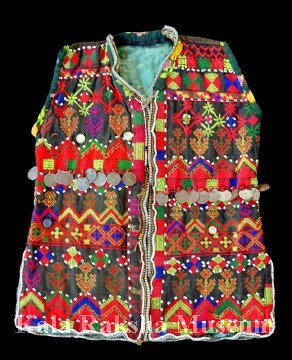|
Description
|
| MATERIALS: Cotton cloth, cotton, silk, wool and metallic threads, beads, metallic zipper, buttons, iron sequins, strings and metallic thread. CONSTRUCTION: Hand stitched, embroidered, petit point, cross surface satin, back stitches. Buttons, beads and sequins are added for accents. MOTIFS: Geometric motifs, Triangles, laher, tree-like forms and hooked forms. Patterns are not symmetrical. COLOURS : Red, green, blue on black. STYLE REMARKS: Combination of cross stitch and surface satin stich is used In Indus Kohistan. The surface satin stitch, called Phulkari is also common in Swat, Hazara and Punjab. Work in Indus Kohistan is always done on black. Liberal use of coins, sequins, buttons and beads is also characteristics of Indus Kohistan. CULTURAL SIGNIFICANCE: Work shows connection to Phulkari embroidering areas. Similar work has been attributed to Uzbeks and Hazaras of Afghanistan. CULTURAL REMARKS: The zipper replaces traditional metallic beads which were attached to edges of garments. Generally Kohistan work is done on twill woven cloth. The plain weave of this piece is unusual; however it allows for counted work. Metallic thread is unusual in this style. Jacket. |
Jacket
-Other Embroideries
-Copyright Statement

COPYRIGHT INFORMATION ~ When using this image, the credit information should be in the following format: Image courtesy of the Kala Raksha Museum.

COPYRIGHT INFORMATION ~ When using this image, the credit information should be in the following format: Image courtesy of the Kala Raksha Museum.